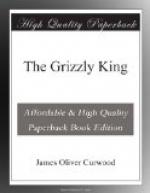Not until long afterward did he know that Oachi had sung to him the great love song of the Crees.
That night and the next day, and the terrible night and day that followed, Roscoe fought with himself. He won—when alone—and lost when Oachi was with him. In some ways she knew intuitively that he loved to see her with her splendid hair down, and she would sit at his feet and brush it, while he tried to hide his admiration and smother the passion which sprang up in his breast when she was near. He knew, in these moments, that it was too late to kill the thing that was born in him—the craving of his heart and his soul for this girl of the First People who had laid her life at his feet and who was removed from him by barriers which he could never pass. On the afternoon of his seventh day in camp an Indian hunter ran in from the forest nearly crazed with joy. He had ventured farther away than the others, and had found a moose-yard. He had killed two of the animals. The days of famine were over. Oachi brought the first news to Roscoe. Her face was radiant with joy, her eyes burned like stars, and in her excitement she stretched out her arms to him as she cried out the wonderful news. Roscoe took her two hands.
“Is it true, Oachi?” he asked. “They have surely killed meat?”
“Yes—yes—yes,” she cried. “They have killed meat—much meat—”
She stopped at the strange, hard look in Roscoe’s eyes. He was looking overhead. If he had looked down, into the glory and love of her eyes, he would have swept her close in his arms, and the last fight would have been over then and there. Oachi went out, wondering at the coldness with which he had received the word of their deliverance, and little guessing that in that moment he had fought the greatest battle of his life. Each day after this called him back to the fight. His two broken ribs healed slowly. The storm passed. The sun followed it, and the March winds began bringing up warmth from the south. Days grew into weeks, and the snow was growing soft underfoot before he dared venture forth short distances from the camp alone. He tried often to make Oachi understand, but he always stopped short of what he meant to say; his hand would steal to her beautiful hair, and in Oachi’s throat would sound the inimitable little note of happiness. Each day he was more and more handicapped. For in the joy of her great love Oachi became more beautiful and her voice still sweeter. By the time the snows began running down from the mountains and the poplar buds began to swell she was telling him the most sacred of all sacred things, and one day she told him of the wonderful world far to the west, painted by the glow of the setting sun, wherein lay the Valley of Silent Men.
“And that is Heaven—your Heaven,” breathed Roscoe. He was almost well now, but he was sitting on the edge of his bunk, and Oachi knelt in the old place upon the deer skin at his feet. As he spoke he stroked her hair.




